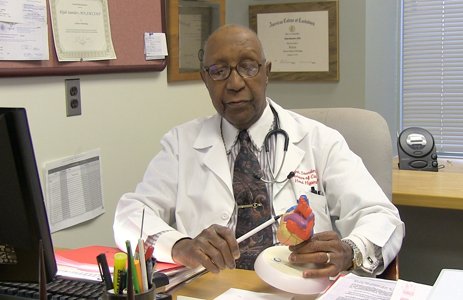BALTIMORE — Prior to adjourning on Tuesday, April 7, 2015, members of the Maryland State Senate observed a moment of silence not for a fallen colleague or a long time government official, but for a man who for decades brought joy, relief and a lot of health care issues facing African-Americans to the forefront.
Dr. Elijah Saunders, who served as professor of medicine and head of the section of hypertension at the University of Maryland School of Medicine, died early Tuesday, leaving a major void not just in the world of medicine, but throughout a Baltimore community that absolutely revered him. He was believed to be 80-years-old.
“I knew Dr. Saunders for almost 40 years and he was my doctor for at least 30 of those years and I can honestly say that he was a giant of a man,” said Maryland Democratic Senator Shirley Nathan-Pulliam. “Yes, he was world renown and anywhere you went, people knew of him. But, he was such a caring and warm individual and when I’d go see him in his office, he never made you feel like you were just a patient. He’d want to know what’s going on in Annapolis and what was going on in my life.”
Barbara “B.J.” Shaneman, a nurse and cardiovascular specialist who worked for more than 20 years with Dr. Saunders, said she didn’t learn that the doctor was sick until late Monday and she planned to visit him on Tuesday.
“I received a phone call that he had passed on Tuesday and it’s devastating,” said Shaneman, who has worked tirelessly with Dr. Saunders in promoting community health, efforts that have served to benefit many in the Baltimore area.
“Dr. Saunders was my teacher. He wasn’t my mentor but he groomed me to be what he wanted me to be which was a good teacher and nurse,” Shaneman said, choking back tears. “He allowed me to do what I did best in the community. He encouraged me, gave me the kind of respect a father gives a child. He corrected me where I was wrong but always in a way that was encouraging.”
Dr. Saunders graduated from Morgan State University in 1956 and four years later, he matriculated from the University of Maryland School of Medicine. He practiced medicine at the University Maryland Medical Center as a cardiologist for more than three decades. He also served as clinical associate professor of medicine at Meharry Medical College in Nashville, Tennessee.
In the 2013 documentary, “Faces of Diabetes,” Dr. Saunders, also the vice president for Graduate Medical Education and Affiliations at the University of Maryland, revealed a connection between diabetes and hypertension, a longtime scourge in the black community.
He said hypertension, which is high blood pressure can often lead to and make worse many complications of diabetes, including diabetic eye disease and kidney disease. Dr. Saunders revealed that most people with diabetes develop high blood pressure during their life and that diabetes makes high hypertension and other heart and circulation problems more probable in that diabetes damages arteries and makes them targets for hardening.
A pioneer in research related to African-Americans and hypertension, Dr. Saunders was a founding member of The International Society of Hypertension In Blacks (ISHIB) and was recognized as an expert on hypertension, especially as it relates to people of African descent.
“He understood hypertension better than anyone and he also looked at the management of diabetes and, rather than making it a crutch, he showed where if properly treated, medication might not be needed,” Shaneman said. “Everyone who knew him was affected in some way.”
Four years ago, Dr. Saunders received the prestigious Herbert W. Nickens Award from the American Association of Medical College, which is given to an individual who has made outstanding contributions to promoting justice in medical education and health care equity in the United States.
“He [was] an energetic and powerful mentor and role model,” Dr. Albert Reece, vice president for medical affairs at the University of Maryland, said in a previous interview. “Throughout his career, Dr. Saunders repeatedly demonstrated his willingness to step forward and be the first.”
Upon Dr. Saunders graduation from medical school, he reportedly was one of only four black medical students in his class of 140 and he was the first black resident to be trained in the cardiology and internal medicine programs, the first black cardiologist in Maryland, and he was instrumental to desegregating the University of Maryland’s hospital wards in 1963.
Dr. Saunders also started the Hair, Heart, and Health (HHH) program to train barbers to perform blood pressure screenings and to refer clients to local health centers. More than 1,800 individual were screened through the program, the vast majority being African-Americans. As a direct result of his findings, U.S. drug companies reportedly now make a point of including African-Americans in their clinical trials, helping ensure all races benefit from research breakthroughs.
“He’s done everything within his power to make equality the standard instead of the goal,” Reece said.
And like many others, Nathan-Pulliam and Shaneman both said he’ll be missed.
“Dr. Saunders is going to truly be missed,” Nathan-Pulliam said. “It’s such a tremendous loss and he was such a special person.”
Arrangements for Dr. Elijah Saunders
Friday, April 10, 2015 at Transformation Church
5150 Baltimore National Pike in Baltimore
Viewing — 3 p.m. to 7 p.m. and Pre-Celebration — 7 p.m. to 9 p.m.
Sunday, April 12, 2015, at New Psalmist Baptist Church
6020 Marian Drive in Baltimore
Family Greeting from 5 p.m. to 6 p.m. and Funeral Service begins at 6:30 p.m.
